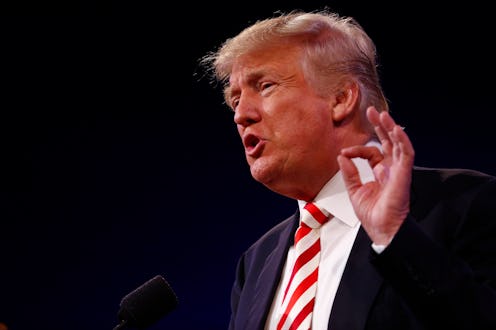News
The People Backtracking On Their Trump Support
An unprecedented number of conservatives and GOP officials have declined to endorse Donald Trump this election season. Some have opted to support the Democrat's nominee, Hillary Clinton, while others have put their weight behind the libertarian, Gary Johnson — or simply decided not to vote at all. Fewer in number are the one-time Trump supporters who later rethought their endorsements or support. Their reasons differ but their unifying experience is that the more they learned about Trump, the clearer it became that they could not support his candidacy. These are seven people who vouched for Trump and then changed their minds.
The most recent batch of converted Trump folk are from Trump’s own National Hispanic Advisory Council. After Trump's immigration speech Wednesday night, as many as 15 of the 30 members signaled to others in the group that they were done. Who could blame them after a speech that included anti-Latino stanzas like this:
Most illegal immigrants are lower skilled workers with less education, who compete directly against vulnerable American workers, and that these illegal workers draw much more out from the system than they can ever possibly pay back.
With that kind of rhetoric, who wouldn't reconsider a Trump endorsement? Sadly, there are still plenty of Republicans who seem more than willing to put up with his xenophobic rhetoric. Mitch McConnell and Paul Ryan have thus far declined to rescind their endorsements (despite being responsible for protecting the party that Trump continues to drag through the mud). They might not be willing to pull their support, but these brave Republicans have.
1) Jacob Monty
Monty is among those resigning after Wednesday night's speech. He's an attorney from Houston and served on the National Hispanic Advisory Council. He explained to Politico why he's done: "I was a strong supporter of Donald Trump when I believed he was going to address the immigration problem realistically and compassionately," he told Politico. "What I heard today was not realistic and not compassionate."
2) Ramiro Peña
Peña is a Waco, Texas, pastor who also served on the Advisory Council. He explained his position in an email. "I am so sorry but I believe Mr. Trump lost the election tonight," Pena wrote. "The 'National Hispanic Advisory Council' seems to be simply for optics and I do not have the time or energy for a scam."
3) Alfonso Aguilar
Aguilar is the former chief of the U.S. Office of Citizenship and was on the Advisory Council. He explained his disappointment to Politico and went on CNN to explain he could no longer support Trump. "It’s so disappointing because we feel we took a chance, a very risky chance,” Aguilar told Politico. “We decided to make a big U-turn to see if we could make him change. We thought we were moving in the right direction … we’re disappointed. We feel misled."
4) Massey Villarreal
Another member of the Advisory Council, Villarreal is a Houston businessman. He went back and forth, didn't support Trump at first but then did before withdrawing it after the speech. He explained why to NBC News. "As a compassionate conservative, I am disappointed with the immigration speech,” Villarreal told NBC. “I’m going to flip, but not flop. I am no longer supporting Trump for president, but cannot with any conscience support Hillary."
5) Stephanie Cegielsk
Another Trump insider was Cegielsk. She worked as a communications director for the Make America Great Again Super PAC, but she was put off as she learned more about Trump, from his comments about Megyn Kelly to the day-to-day at the campaign. As she said so in an open letter to Trump supporters: "No matter how many times he repeats it, Trump would not be the 'best' at being a president, being in shape, fighting terrorism, selling steaks, and whatever other 'best' claim he has made in the last 15 minutes."
6) Rep. Mike Coffman
Of the Republican majority in the House and Senate, there are just two who have gone back on their endorsements. One is arguably Coffman. In February, an aide said that he would "obviously" support Trump. Then, in an August Huffington Post story on vets asking GOP officials to un-endorse Trump, an aide said Coffman had not endorsed Trump and added, "Rep. Coffman has voiced grave concern about Mr. Trump’s policies and his tone." Coffman has also tried to argue he will "stand up" to Trump in ads.
7) Sen. Mark Kirk
The Illinois senator is the best example of a GOP un-endorsement. He had first said he would support the Republican nominee in interviews but then Trump attacked an American judge with Mexican heritage who was overseeing the Trump University case. He explained why in a statement: "Donald Trump’s latest statements, in context with past attacks on Hispanics, women and the disabled like me, make it certain that I cannot and will not support my party’s nominee for President regardless of the political impact on my candidacy or the Republican Party."
It remains to be seen who else will join these conservatives in rethinking their support for Trump. With more speeches like Wednesday's very possible, there could be plenty of motivation.
